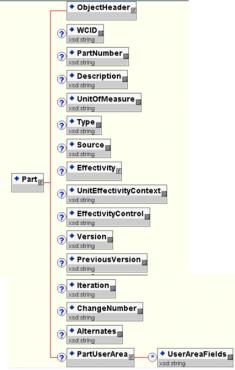Part Schema
The following describes the elements contained in the part schema.

Element | Description |
|---|---|
ObjectHeader | The information for the current object. For more information, see Common Business Object Schema: Object Header. |
WCID | Unique identifier for part; internal to Windchill PDMLink. |
Part | Unique identifier to be used as part number in the distribution target. This is the number displayed inWindchill PDMLink when the part is being looked at. |
Description | Descriptive text provided with the part. |
UnitOfMeasure | Units in which the part is measured. For example, liter, inches. |
Type | Type of part. For example, finished good, semi-finished. |
Source | Indicates if the part is bought or made internally by the business organization. |
Effectivity | Values used to determine planning. Contains the following subelements: StartDate: Date when the part becomes effective within the organization. EndDate : Date when the part effectivity ends. |
Version | The part version. Indicates a major change to the part. |
PreviousVersion | The last version published successfully. Used to determine if Version and PreviousVersion are equal, and if so then Version information does not need to be published again. |
Iteration | The part iteration. Indicates a minor change to the part. |
ChangeNumber | Value for the Engineering Change Number for creating, deleting, or updating the part. |
Alternates | Contains data on alternate parts which can be used if the current part is out of stock. This value is not mapped. |
PartUserArea | This is a complex element and can contain any number of child elements. This element can be used for mapping extra attributes or global attributes. Customizers can create any number of child elements inside this element to map extra attributes of the ESI Response’s Part element. |
UnitEffectivityContext | Value for the Effectivity context. Currently not implemented as Oracle uses only the direct BOM header as the Effectivity context. |
Effectivity Control | "Date" Or "Unit" For a BOM header it is based on the Effectivity values of BOM components in Windchill ESI Response data. For a part that is not a BOM header it is fetched using the ESIORALookups.properties file. |